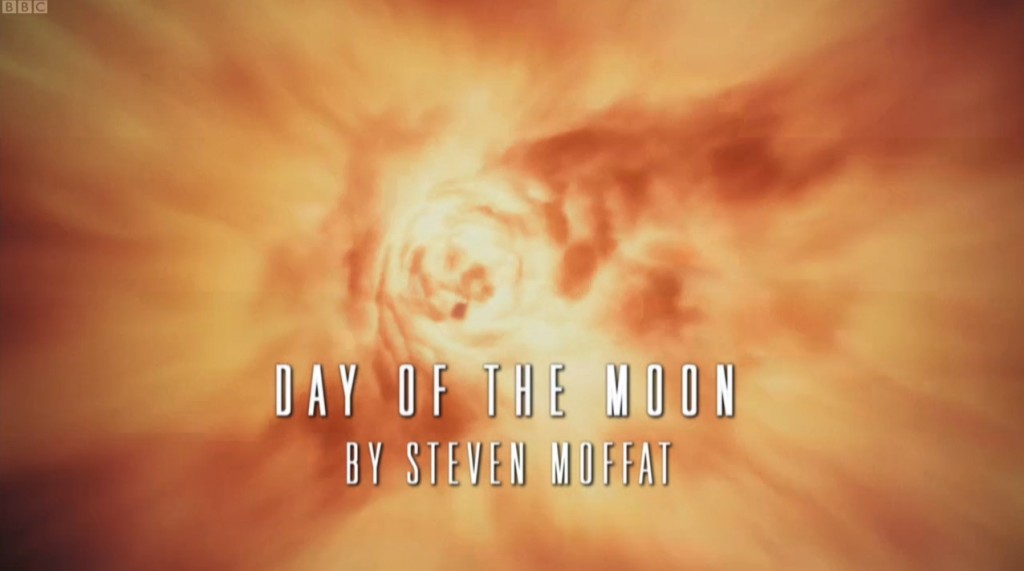
Spike Marshall: There’s a wealth of stuff to talk about this episode, rogue time-children, Silence, the Norman Bates maximum security Orphanarium, The Doctor getting his genocide on, River and Rory being awesome and the Doctor’s beard.
Last week we kicked off by talking about the opening of the episode, so this week let’s talk about resolutions. Doctor Who has always had a problem with resolutions, often relying on sleight of hand to triumph over the odds. Russell T Davies has a real skill for setup, but his payoffs often didn’t really work. The problem is that the threats had to get exponentially bigger and that the episode balance would give way too much time to setup, which meant that conclusions in the New Series tended to be rather limp wristed. The Doctor’s solution to the Silents was built on the same issues, with the episode setting them up as something which had always been in Earth’s history, an all-powerful threat which had shaped humanities destiny for millennia. The reason I bought the resolution is because the solution was setup throughout the episode and used the central conceit of the villains in the interesting way. The idea of the Silents manipulating humans throughout history, and then having that manipulation used against them in an invisible war of independence, felt properly thought out and rationalised. Of course I tend to be a lot more forgiving of the plotting in Doctor Who than most, so I’ll throw it out to the team. Did you guys buy the Doctor’s ultimate solution?
Ian Pratt: A two-part opener this dense begged for a cerebral solution; thankfully, that’s just what we got. In scripting, telephones are something of a naughty word. Writers are advised to steer clear of them as much as possible because they aren’t terribly cinematic and often come across like a lazy solution to narrative problems. This episode was a charming reminder that some rules are begging to be broken. I thought it was wonderful how such a (now) commonplace object like a video phone became the solution to mankind’s woes… simply because of the nature of the story’s time-frame. I bought the solution, then, because it was just as satisfying as it was clever.
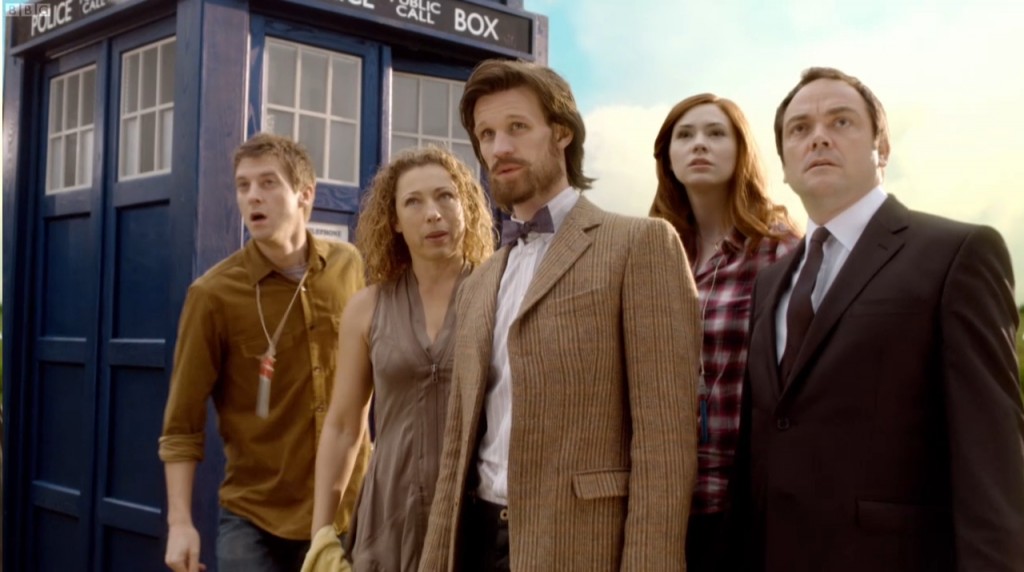
Adam P: It was one of the more elegant solutions we’ve seen so far–didn’t see it coming at all (I actually laughed out loud when I realized what the Doctor was doing), it was perfectly set up by the information we were given, it wasn’t a cheat, and it used the elements of the era perfectly. Not only is the Doctor triumphing over brute force and yadda yadda, but he’s using arguably the greatest achievement of human reason to do it.
I’m not that well-versed in classic Who, but I’ve heard a lot of people talk about how it was one of the first genre shows to use the idea of television as a medium within the series, and I think the new show has continued this–both episodes with the Weeping Angels used the idea of television as a weapon or a tool (‘Blink’ with the Doctor’s DVD Easter eggs, ‘Time of Angels’ with the angel literally coming out of the screen) and other episodes like ‘The Idiot’s Lantern’. Actually this was a better summation of the ideas in ‘The Idiot’s Lantern’ in less space.
And I sort of take issue with the “genocide” thing. I think, given how deeply rooted the Silents (I guess it’s Silents, not Silence, the Silence being the thing that’s going to fall, and the Silents being the things that are oh dear I’ve gone cross-eyed) were, this was as elegant and nonviolent a solution as was possible. The Silents are going to pack up and head out if they know what’s smart. It’s not genocide, it’s simply the threat of force that can be easily avoided if they just back down.
Kristina D: I won’t bemoan The Doctor’s decision as genocide, either. I can’t recall anyone crying on the Daleks’ behalf when he took care of them. The decision didn’t really wow me, but I can admire Moffat for its cleverness. In light of everything else that was happening in this episode, combined with the fact that the Silence storyline is far from over, I was underwhelmed by it.
Ben A: I thought that the Doctor’s “ultimate solution” felt a little underwhelming precisely because it wasn’t ultimate- the Silents have been built up far too much, and far too much about them has been left unresolved- and I’m quite certain we’ll be seeing them again this series. I’ll agree with Adam that it was elegant, and like all Moffat’s plot resolutions it was properly foreshadowed and worked into the internal logic of the story thus far, entirely unlike RTD’s heavy reliance on deus ex machina.
Of course, the flip side is that most of the plot of this opening story hasn’t been resolved at all- we still don’t know why the Doctor was shot in the beach, what’s going on with the little girl who can apparently now regenerate, who that woman with the eye patch was, why the Silent use the pseudo-TARDIS from the lodger or what they use it for, and so on. Combined with the fact that the Silent will almost certainly be back with a vengeance (even if their hold on the Earth will have been severely shaken), and I’m not sure Moffat can be said to have resolved anything. We’ll see where we stand at the end of the initial episode run.
Bit of a long-term continuity niggle, but does anyone else remember River Song, at the end of The Big Bang (last year’s finale), saying that next time they met the Doctor would find out something about who she was? Because that didn’t happen, either.
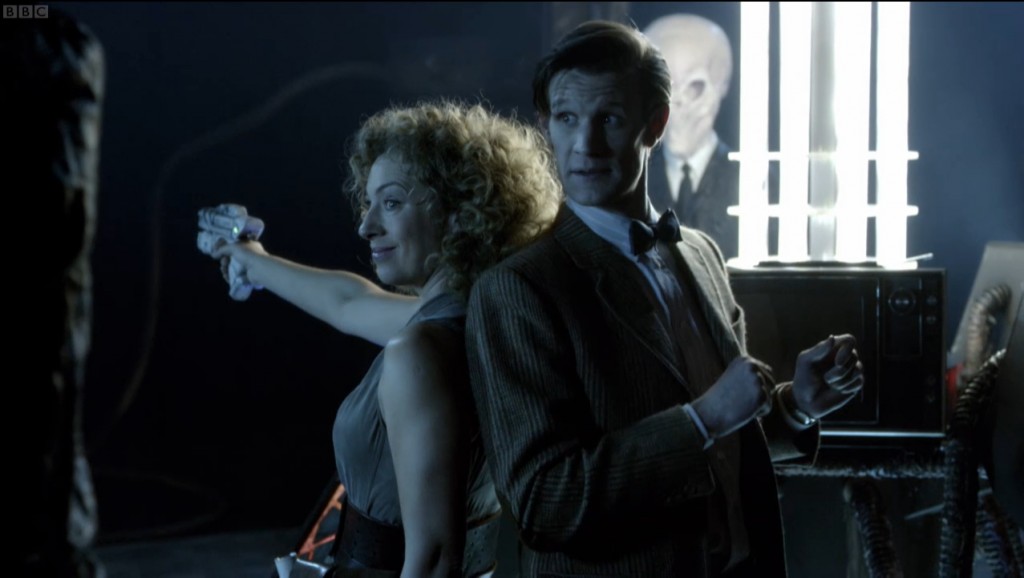
Adam: She said “very soon now”. I don’t think she said “next time”. Though she could have been referring to the kiss, which was a pretty obvious clue.
I had a bit of an argument on the boards over whether River is the Doctor’s wife. To me that’s so incredibly obvious and has been hammered home ad nausea that if that is the resolution it’ll be genuinely disappointing. Obviously a River-Doctor romantic relationship is pretty obvious at this point, but I really hope there’s something more to it than that. There needs to be some clever wrinkle.
Ian: I was just about to say the same thing, Adam. I took the revelation to be River’s little knowing glance toward the Doctor last week which seemed to clear up whatever doubt remained over the nature of their relationship. Anyway, there are so many strands and questions we have to chew on and I’m sure that will come in time. Right now, though, I’d like to take a moment to address how much I enjoyed Canton and Amy going all Mulder and Scully in the Terror Hous-sorry, “Orphanage.” The only way that place could have been creepier is if Clint Howard had played the caretaker. Although it was only a small portion of the episode, the sequence was strong enough to capture that elusive “mini-movie” feel so important to subplots on TV shows. The quasi-Southern Gothic feel – thanks largely to the drawl on Bonkers McScrewball – was a lovely touch, too. I know some people felt last week’s episode had some decent scary moments but I felt this took it up a notch; the moment when Amy spotted The Silence’s skull cluster (band name?) on the roof like she was in the Bat Cave being a prime example. Also, it’s going to take something special to top that pre-credit sequence.
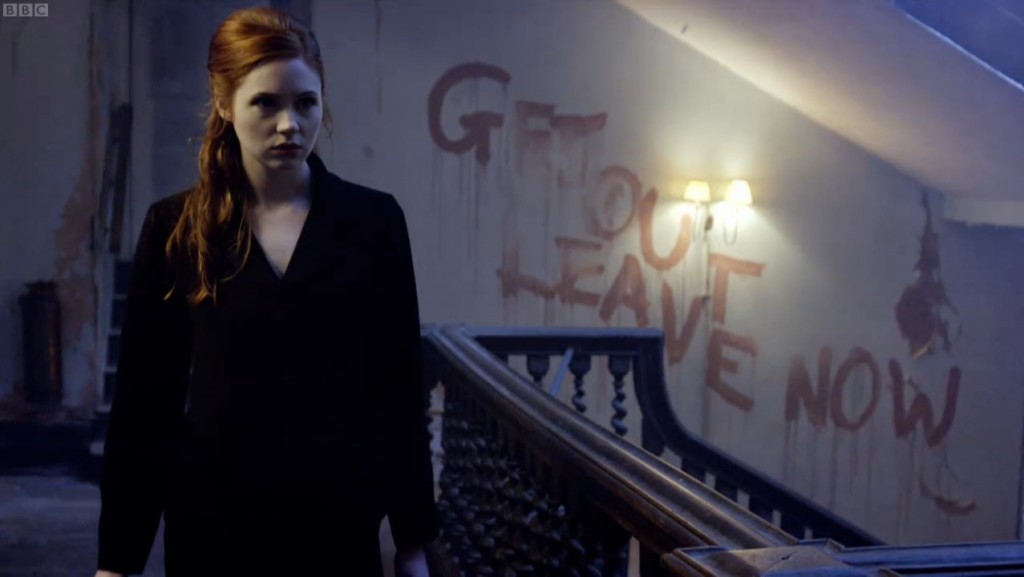
Ben: Yes, the Orphanage subsection was fantastic (though raising even more unanswered questions), partly because it finally used the monsters to their full potential by having the audience not see them half the time either, and have to deduce them from the marks. I haven’t seen horror that played with audience perception of the story like that since the (relatively unknown) early 90s BBC drama Ghostwatch, and it was very welcome.
On the River/Doctor relationship angle I’m definitely with Adam, again- nothing Moffat’s done has ever been straightforward, plot-wise, so why start now?
And yes, the pre-credits sequence- seeing all the regulars get gunned down one by one was unexpected and chilling. I again have to wonder how confusing some viewers found the 3-month time jump, though, especially on conjunction will all the unresolved plot threads- as I said last week, the story’s excellent, but one of the more complex in the show’s history, which could make it downright intimidating for a newcomer.
Oh, and on moments we liked? I said this last week, but even more so this time: Arthur Darvill. He got the subtlest acting and character moments of the episode, listening to Amy’s message then immediately having to talk to the Doctor, and the guy nailed it.
Kristina: I was SO impressed by him in that moment. When I saw The Doctor walking toward Rory in that scene right as he hangs his head, I was waving my hands frantically as if to say “No! Don’t walk over there! You’re about to get slugged!” The fact that he could sit there and have a conversation with the man he believes is the object of his WIFE’s affections shocked me. I was not a Rory fan at all last season. I did not get what Amy saw in him, and it reeked of another Mickey/Rose “tin dog” situation, but he won me over in this episode. That scene where Rory angrily declares to The Doctor that Amy always knows that he is coming for her, only to have her immediately cry out for The Doctor instead made me wince. By the time he overhears that she confided in The Doctor and not him about the pregnancy, I just wanted to hug him. He loves her, but boy does that woman take an emotional shank to him sometimes.
Spike: When Amy started talking about the man dropping down from the sky and Rory just visibly slumped I felt so genuinely bad for him. I said it last week but he is genuinely the heart of the show.
Adam: Yes, like everyone else I like Darvill, but this brings up one of my issues with the show that they clearly tried to address, but didn’t quite pull off: Amy and Rory’s relationship is not healthy. I like Amy, but the way she treats him is kind of twisted. I know that WE, the audience, knows how much she loves him from “Amy’s Choice”, but here’s a guy who literally watched over her throughout time and cared more about saving her life than saving the universe, vs. a girl who doesn’t even make her husband the first person she tells when she’s pregnant. And we’re, what, six months? A year? Into their marriage, and he’s still unsure of who she’s talking about when she pours out her feelings over the radio (nice of her to leave that completely ambiguous, too). That’s more than a little messed up. I think they really need to do an episode where Amy realizes just how horribly she treats him sometimes.
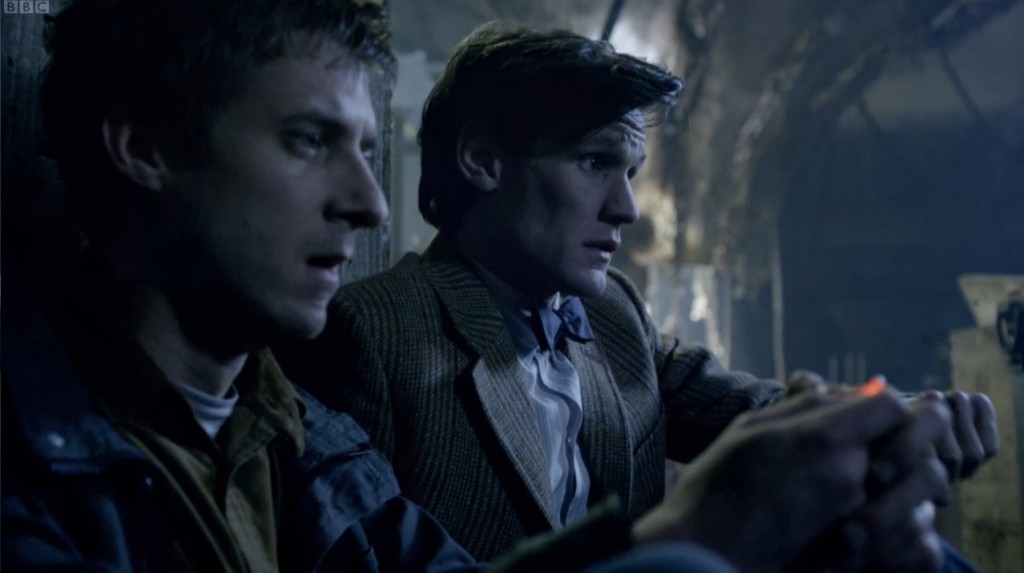
Ian: It warms my heart to see so many of the team joining me full-time on the Darvill love train. I don’t know how many times I’ve said it before but it bears repeating – he does the most with the least material. As much as I was happy that he got the girl he wanted at the end of last season, I’m still convinced Rory’s too good for Amy. No one who showed the kind of true chivalry in waiting all that time like he deserves to be treated like a third wheel by the person he did it for. Instead of putting to bed any anxieties he might have over their new friend, Amy threw herself at the Doctor, flirting shamelessly with him in front of Rory. She’s too immature to be married to anyone, least of all a stand up gent like him. But I digress. I don’t necessarily see that as something Moffat and his co-writers have failed to address. I think of it more as a very deliberate way of keeping people’s interest bubbling away on internal TARDIS matters as well.
Ben: To some extent I think they just suffer from being a relationship on a television show, as the depressing fact is that healthy, contented relationships only make for good drama if one half gets killed off. In some ways I’m pleasantly surprised by how well Amy and Rory have been holding up as a couple given all the potential for the alternatives.
Adam: Just to interject: I want to make it clear that this doesn’t completely wreck the show, and in fact it’s a testament to Karen Gillen’s acting (which isn’t often recognized) that Amy is as likable as she is, despite sometimes being given some hard material to work with, characterization-wise.
Ben: To shift topic a bit, Stuart Milligan is an excellent (if uncharacteristically likeable) Nixon, but did anyone else wonder why the FBI weren’t suspicious of him emerging from a prison in the middle of Area 51?
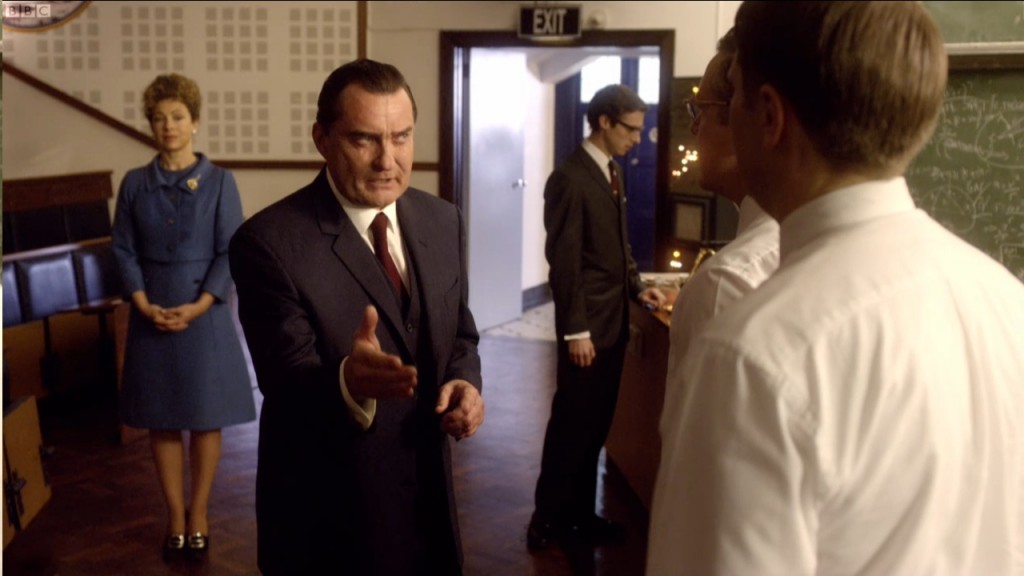
Ian: In the moment, I chalked that up to people being over-awed by his sudden emergence. Maybe a call-back to the “I am your Commander in Chief” line, a don’t ask questions kind of thing. But in the context of all the others questions raised by the episode? Moffat’s probably having a good laugh to himself. He could have us dissecting a funny coloured door knob if he wanted, I expect.
Adam: I thought it was a little weird how positively they portrayed Nixon…I almost think it ties into what I said last week, about how they were trying to land an American audience and didn’t want to step on too many toes (the amount of gunplay in this episode might be a bit of a cynical attempt to rope in Americans as well, though at least they did feel the need to emphasize the Doctor’s dislike of guns). But on the flip side, you can give them credit for doing an episode with Nixon and not feeling the need to editorialize. For all that Doctor Who has strong political undertones, it always made sense to me that he wouldn’t be too judgmental of historical figures–the guy’s seen everything and been everywhere. Because of course, otherwise you get into wondering why the Doctor doesn’t rush in and try to prevent the bombing of Cambodia, and indeed, every other bad thing in the history of the world.
At least there was a bit of an acknowledgement of politics Milligan’s final scene…speaking of which, one of my milder but prevalent complaints about last season was that they sometimes seemed to be rehashing Russell T. Davies’ run–usually better, but still rehashing. And now they’ve introduced a gay American secret agent from another historical era that will probably be a recurring character. Sound familiar?
Spike: Then again good old Captain Jack was a dual creation if I remember rightly, partly RTD, partly Moffat. But yeah, I get your point. Despite the inherent timey-wimeyness of Moffat’s run, it does feel like it is kind of following the template that RTD created. Although I think Moffat’s run of Doctor Who is far more of a kids show than RTD. I don’t mean that at all disparagingly either. I’d say that Moffat’s run is the Pixar to RTD’s DreamWorks, where Moffat created a show primarily for a kid’s audience but never condescended to the kids whilst RTD created a kids show but made a point of consciously adding ‘adult’ bits for the parents.
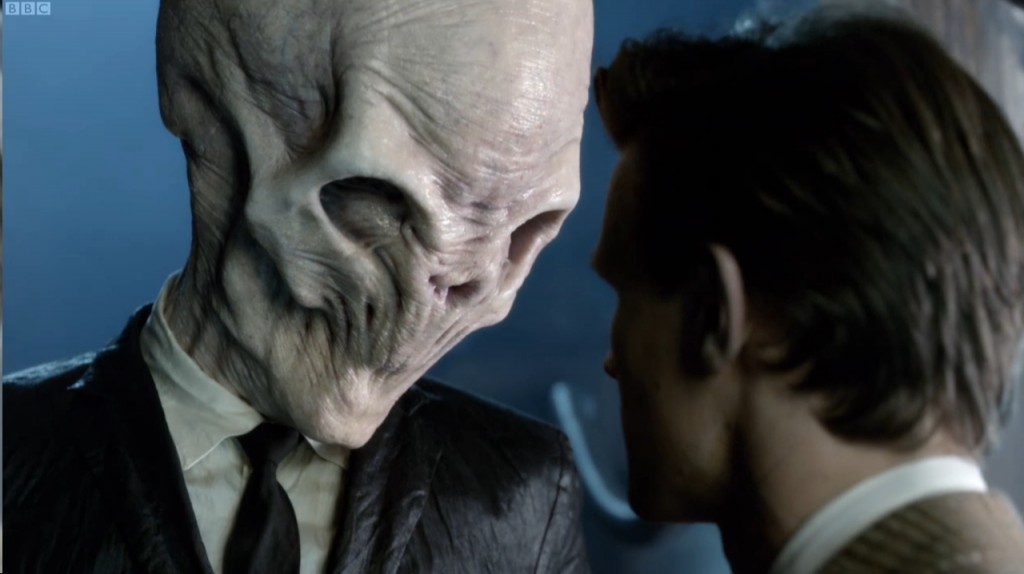
Ben: I really like that comparison, actually- the RTD era had a lot of the forced pop-culture references and slightly painful adolescent humour that sinks most DreamWorks films. I think Moffat has a better intrinsic understanding of children’s television, and the show’s felt far more innocent right from the moment Amelia Pond wanders into her back garden at night.
On the political note, Doctor Who has a long history of being much less tied to one ideology or point of view than most other genre shows (though obviously helped by the ever-changing writers). There were old series stories that criticised and satirised Democracy or that had the Doctor fighting to preserve, say an old-fashioned supreme monarch. The non-judgemental nature of the show has, combined with the nonviolence, always been one of the things that have set it apart for me.
Spike: I think the writers of Doctor Who know better than to take an overt political stand. Partly because it’s a massively popular show for the BBC, who’s bread is buttered by politically impartiality, and partially because real world politics are generally a bit much for the show to deal with. Some of the worst episodes of the old series were thinly veiled parables for political situations happening in Britain. I think Doctor Who works better when it’s being as broad as possible, and dealing with specific political situations often narrows it down to much.
In terms of tone I really appreciated how this episode seemed to balance a gothic horror tone with its broader comedy elements. One of my favourite runs of Classic Who was Hinchcliffe’s tenure as producer, where he brought in quite a few old school Gothic elements and made the show genuinely spooky and creepy. My fondness for the Fourth Doctor is generally due to how his best stories often played out like straight up horror stories with science fiction elements. I think the creepiness of the Orphanage in this episode was perfectly matched by great little comedy moments like Nixon emerging from arbitrary rooms whilst ‘Hail to the Chief’ played from some unseen band. It’s the kind of weird tone that Doctor Who has always done well with, I mean this is a show where one of its main villains duplicated himself six billion times purely to use the ‘Master Race’ pun.
Adam: Moffat is really, really good at doing “PG horror”. There’s never anything overtly gory or shocking, but the Weeping Angels, the Empty Child, the puppet-robots from The Beast Below, the clockwork robots from The Girl in the Fireplace, and now The Silents are all utterly terrifying–and usually on a far deeper and more unsettling level than Jason Voorhees hacking up co-eds–while still being suitable for a kid’s show. Shifting from showing the Silents to scenes of “missing time” in this episode, as with Amy in the orphanage, was a masterstroke.
Spike: I think Moffat just understands children’s psychology, he knows what their fears are and how to express that. I half expect his next monster just to be him walking onto screen and declaring ‘Soon your parents shall die and you shall be all alone’ and then walking off.
Ben: Horror’s been Moffat’s defining characteristic as a writer since 2005, mind (unless you’re inclined to look back to ‘Curse of Fatal Death’), but he is very accomplished at it. The Silent are arguably the creepiest monster yet in concept, but they haven’t been given as much use when it comes to scaring people as, say, the Angels or the Gas-mask children. Again, I suspect to see this change later in the series.
Spike: I love the Silence just because they’re the first monster in ages that could do a good ‘DOCK–TOORR’. It was like a little blast from the past.
Ben: True, though that was always a Sontaran stock in trade as much as anything, and they’ve not exactly been absent lately.
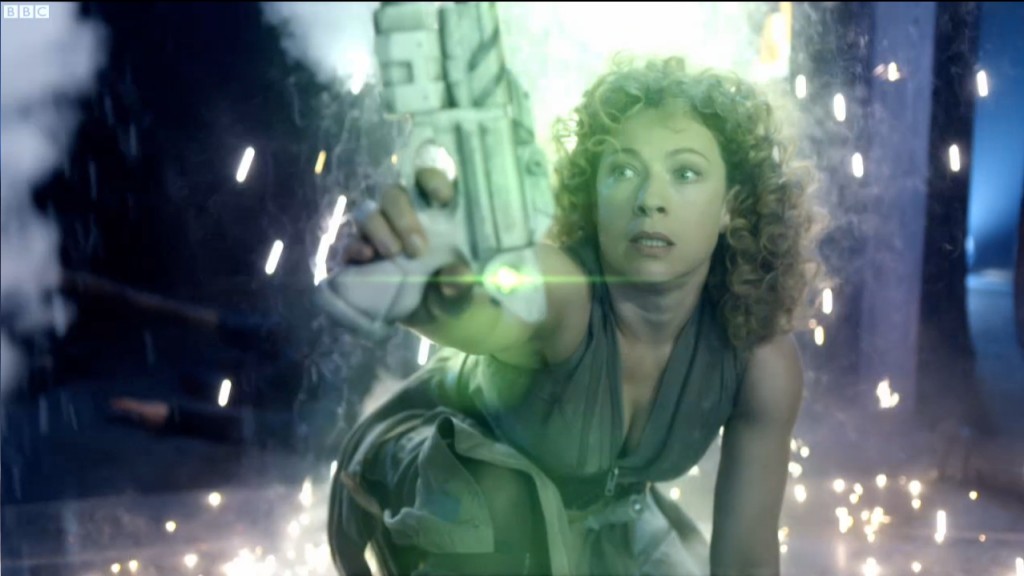
Spike: Just a quick straw poll. When the Silents are hissing ‘Silence will Fall’, do you think that’s a threat or a warning. That the Silents themselves are perhaps doing some good, and the Doctor by running them off has led to unseen consequences.
Ben: This being Moffat, I have a suspicion you’re right. They’re certainly not the ultimate masterminds behind last year’s TARDIS explosion- that will be something still left to come.
Ian: If they weren’t threatening our heroes, they could use a lesson or two in intergalactic etiquette. However, thinking of these things in video game terms, it would be pretty odd to introduce the “Final Boss” in the opening episodes (even with all that teasing beforehand) only to have another ding-dong with Team TARDIS at season’s end. Unless the lay of the land changes massively, that is.
Adam: Well, it would certainly be really weird if the Silents and the Silence were two separate entities. My knee-jerk reaction is that the Silence is some kind of event that the Silents want to trigger…like they’re cultists and this is their apocalyptic god. OK, that’s lame, but you get what I mean.
Spike: I’m just thinking about Ian’s remark about alien etiquette. Just picturing some Silent flicking through ‘Welcome to Earth’ The Will Smith Guide to Earth Customs and being all like ‘Oh…right…they don’t like it when we enslave and threaten them’, and then marking it down for future reference.
Ian: Welcome to Earth… not to be confused with Gettin’ Jiggy Wit’ E.T.: Now That’s What I Call a Close Encounter!
Adam: The Alien Guide To Not Exploding Earthlings. That would probably be very useful to Doctor Who aliens.
Ben: Safety in Numbers: the Importance of Invading in Groups Larger than Six
Spike: The Davros Efficiency Pamphlet: Control your Interstellar Empire from one easy to use control panel. That one’s VERY popular.
Kristina: We need to discuss that ending. I will not type the expletives that flew from my mouth when I saw that girl regenerate, but what did you guys think of that?
Ian: I don’t think we should discuss it until we’ve heard your book title, Kristina.
Kristina: Tea Party: They’re Just Like Us!
Spike: OK, so Annie the little exploding Orphan Girl. What was the deal with that? The show is pretty clearly wanting us to think she’s Amy’s daughter and they definitely put the idea into our head that embryos could be all timey-wimeyed up from time travel, but she was in the in the Silent Insemination Pavilion for quite a while.
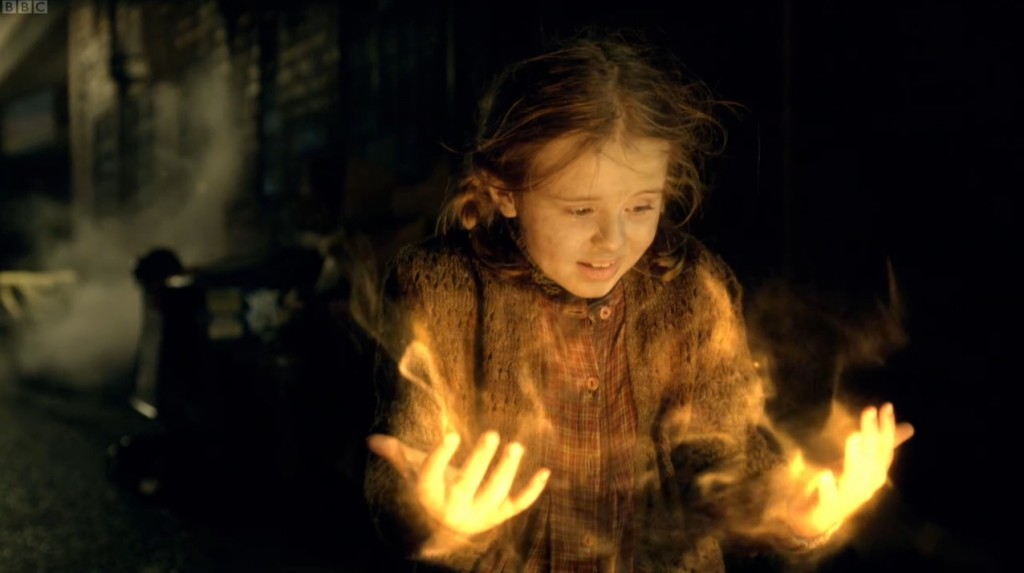
Ben: Too soon to call. Amy’s daughter is too in-your face obvious, there have been faint hints that River was pregnant (which would make more sense if so) and I have a suspicion the only reason Jenny hasn’t popped up recently is Georgia Moffat being actually pregnant. (And yes, someone I know advanced the theory that the regenerating orphan is Tennant and Moffat’s real-life baby)
Adam: By the way, the Silent Insemination Pavilion is the worst attraction at the 1986 World’s Fair. Seriously, do not go there.
I tend to agree, the child as Amy’s daughter is probably a fake out–it’s too easy to associate her with Amy’s pregnancy. But maybe not–unlike River and the Doctor’s marriage it’s not so strongly hinted at that revealing it would be disappointingly obvious.
I think that the stuff with the orphanage is significant to her–in fact, I’m pretty sure that’s why Moffat stuck that whole sequence in there–and when you combine it with the mysterious “She’s dreaming” lady, it sort of looks like we might be heading for some kind of twist involving this all being in Amy’s mind, a la the ‘Normal Again’ episode of Buffy the Vampire Slayer. It would be way too easy to do a story where it’s revealed that Amy was consigned to an orphanage or insane asylum as a child after she started raving about her imaginary friend the Doctor. I mean, I really hope that’s not what they’re doing, because I can’t see how they can do that plot and make it fresh and unpredictable (of course all this ISN’T in her head, or the show is over) but that’s the most obvious conclusion to be drawn from these clues. How the regeneration kid fits in there, I don’t know.
Ian: Interesting theories. My track record with predictions is spotty at best, but I’d be surprised if we see the Crazy Li’l Amy angle. It’s not me dismissing your point, Adam; I know you’re not suggesting that’s what will happen. It just seems to me more like the kind of thing we’d be invited to anticipate given Amy’s back-story. Every mention of her childhood last season was handled largely in good humour. Amy was the kooky member of the family and “The Raggedy Doctor” she obsessed over was more a subject of fun; he was something to be laughed at when brought up as opposed to a Freddy Krueger style object of fear and shame to be brushed under the rug. I don’t remember anything suggesting a stint between padded walls and the like. Would a little Scottish Girl, Interrupted style Gothic detour sit right alongside the lighter wedding reception scenes from last season?
Spike: I think more than anything else I was impressed by how well shot and directed that sequence was. There’s a certain energy and finesse which actually made it genuinely exciting. Because the show generally only uses regeneration for special occasions it makes moments like that really powerful, there’s still something undeniably special about them despite the fact that by my count this is the sixth Regeneration we’ve seen on New-Who.
Casey Moore: I think this season is going to be one of those where you really have to just hold on for the ride the whole time and hope you enjoy it. It is clear that Moffat has a grand plan and that is going to tie back into the first season as well. Everything was foreshadowed, but damn if it wasn’t fun seeing it all come out and the way it came out in the end.
I have to say by the way, I think I got an idea of what it must have been like growing up in the UK with this show since my 7 year old was glued to the episode been when he was clearly frightened by the Silents (who he calls the Death Masks). The show clearly has faith that everyone will tune in, and like classic Looney Toons cartoons, there is plenty for both kids and adults.
I am hoping for more Mark Sheppard. He was quite fun and a nice balance to the awe and wonder of everyone else. He is the companion who gets the job done.
The thing I love about Matt Smith’s Doctor is the balance of a child with a very old man who is not afraid to wipe the universe of anyone he deems a threat to humans. It goes back to him on top of that hospital: “Run.” He is the boogeyman of time and space, unless you are human and then he is your imaginary friend.*
Kristina: I am also hoping for more Mark Sheppard. I have a strong hunch that Canton’s intended spouse is that Secret Service agent. There was something about the way that those two bickered in the last episode that smacked of familiarity.
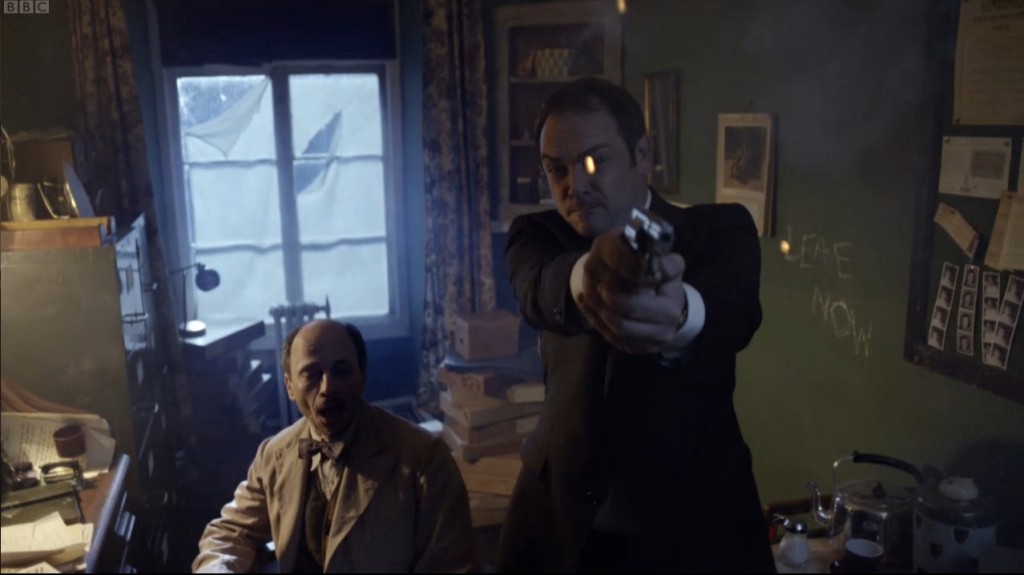
Ben: Worth bearing in mind the Doctor comes down almost as hard on the human race if they’re exploiting/enslaving aliens.
But yes- also hoping for more Sheppard.
Spike: You can never have enough Mark Sheppard. He’s one of the actors that can inject a ton of personality into even the smallest, shallowest of roles. Moffat has done well in building up a fantastic ancillary cast. Tony Curran, Ian McNeice, Mark Sheppard, all managed to do so much with the little they were given.
I feel a little better about the season in general now that I’ve seen both episodes. They seem to slot together really well and provide a great framework for the season to come. Considering that this season is essentially bisected I think we needed that immediacy to kick things off, even I have a suspicion that we won’t get any traction on the main plot line for a few more episodes.
Ben: Like last week, it was again hard to judge this story until we’ve seen all that dangling plot wrapped up. Some lovely suspenseful scenes and surprising twists, though.
Kristina: The more that I think about this episode, the more confused that I become, but I’m still invested in seeing what Moffat’s got in store for us.